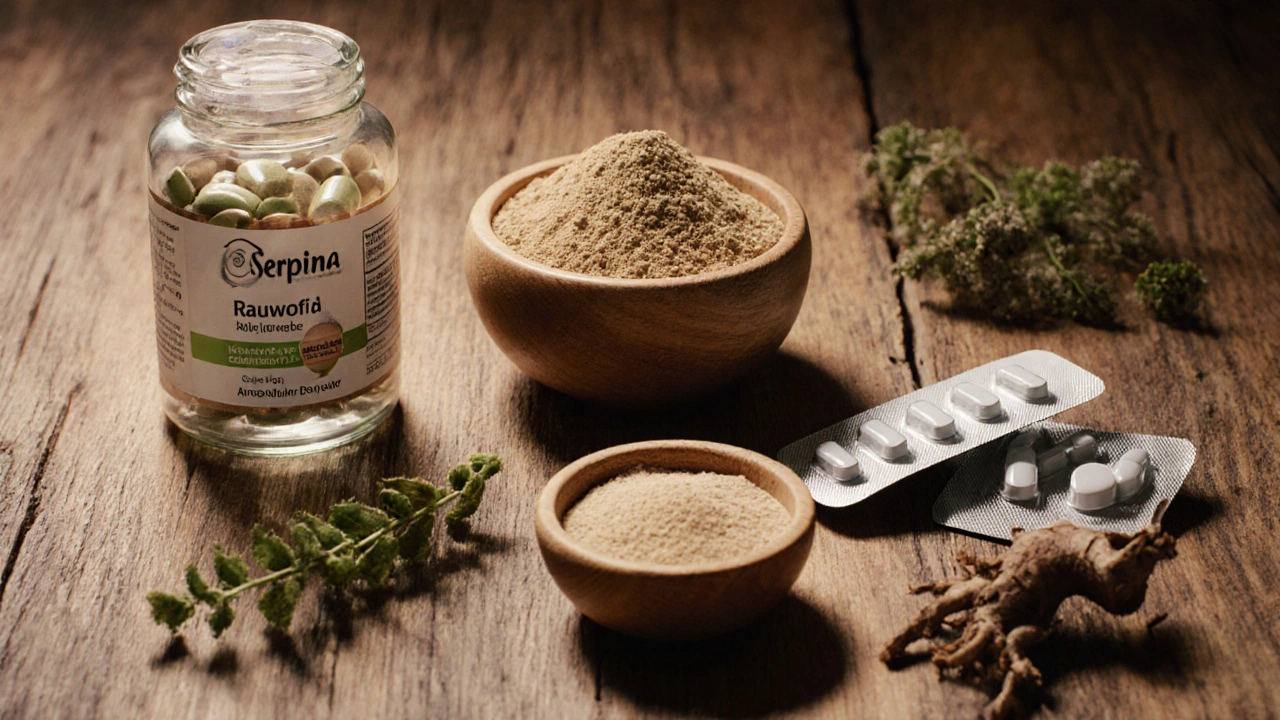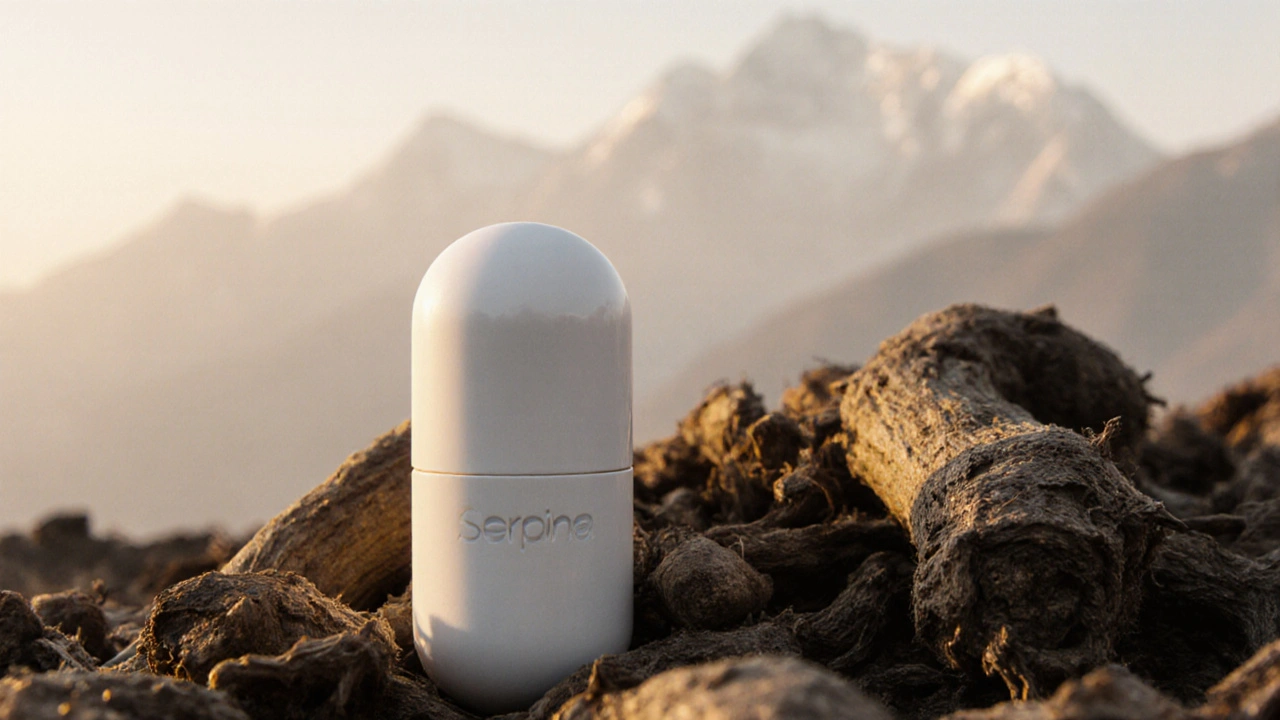Serpina vs. Alternatives Comparison Tool
Enter your preferences and click "Compare Options" to see how Serpina stacks up against alternatives.
Trying to decide whether Serpina (the brand that sells Sarpagandha) is the right choice for your blood‑pressure or anxiety needs? You’re not alone - lots of people are hunting for a natural option but get tangled in a sea of herbs, old‑school drugs, and modern pharmaceuticals. This guide cuts through the noise, lines up the most common alternatives, and shows you exactly where Serpina lands on effectiveness, safety, and price.
What Is Serpina (Sarpagandha)?
Serpina is marketed as a standardized extract of Rauwolfia serpentina, a climbing shrub native to the Himalayas. The plant’s root contains alkaloids - mainly reserpine - that lower blood pressure by depleting catecholamines in nerve endings. In traditional Ayurvedic practice, the herb is also used for anxiety and insomnia. Modern supplements usually give 250‑500mg of dry extract per capsule, standardized to 0.5% reserpine.
Why Compare? The Jobs You’re Trying to Solve
- Control mild‑to‑moderate hypertension without prescription meds.
- Find a calming herb that doesn’t leave you groggy the next day.
- Stick to a budget - many users compare costs per daily dose.
- Check safety if you’re on other meds (e.g., antidepressants).
- Choose a product that’s transparent about dosage and purity.
Top Alternatives to Serpina
Below are the most frequently mentioned substitutes, grouped by type.
- Rauwolfia serpentina (raw herb) - the same plant, but usually sold as dried root powder or a tea.
- Reserpine (synthetic prescription drug) - the isolated alkaloid, historically used for hypertension and psychosis.
- Ashwagandha (Withania somnifera) - an adaptogen that can lower stress hormones and modestly reduce blood pressure.
- Valerian root (Valeriana officinalis) - a sleep aid that also eases nervous tension.
- Hydrochlorothiazide - a thiazide diuretic, the most common first‑line prescription for hypertension.
- Beta‑blockers (e.g., atenolol) - prescription drugs that blunt the heart’s response to stress hormones.

Comparison Table
| Ingredient | Form | Primary Use | Typical Daily Dose | Notable Side Effects |
|---|---|---|---|---|
| Serpina (Sarpagandha) | Capsule (standardized extract) | Hypertension, anxiety | 2×250mg caps | Drowsiness, nasal congestion, possible depression |
| Rauwolfia serpentina (raw) | Powder/tea | Hypertension, insomnia | 1-2g dry root | Gastro‑intestinal upset, low blood pressure spikes |
| Reserpine | Prescription tablet | Hypertension, psychosis | 0.05-0.1mg | Depression, nasal stuffiness, bradycardia |
| Ashwagandha | Powder/capsule | Stress reduction, mild BP drop | 300-600mg | Stomach upset, occasional drowsiness |
| Valerian root | Capsule/tea | Sleep aid, anxiety | 400-900mg | Headache, vivid dreams |
| Hydrochlorothiazide | Prescription tablet | Hypertension, edema | 12.5-25mg | Electrolyte loss, increased urination |
How Serpina Stacks Up
Effectiveness: Clinical data from the 1960s show reserpine‑based extracts can reduce systolic pressure by 8‑12mmHg in mild hypertension. Modern trials on standardized Sarpagandha extracts echo a 5‑10mmHg drop - not as powerful as hydrochlorothiazide, but respectable for a natural product.
Safety profile: The biggest red flag is the risk of depression. Serpina’s lower reserpine concentration (0.5% vs. 0.7% in pure reserpine tablets) cuts that risk, but users with a history of mood disorders should still be cautious. Nasal stuffiness is a quirky side effect many herbal forums mention.
Cost per month: A 60‑capsule bottle of Serpina retails around $30AU, translating to roughly $15AU for a 30‑day supply. Raw Rauwolfia powder is cheaper at $8AU per month, but you lose the dosing precision of capsules. Prescription reserpine costs $5AU/month in generic form, but you need a doctor’s approval.
Convenience: Capsules win over powders and teas for busy people. No need to brew a brew or measure a scoop each morning.
When to Choose an Alternative
- Need a stronger drop: If your systolic reads 150mmHg or higher, a prescription diuretic like hydrochlorothiazide or a beta‑blocker will likely get you there faster.
- Worried about mood effects: Ashwagandha or valerian provide calming benefits without the depression risk.
- Budget is tight: Raw Rauwolfia powder is the cheapest natural option, but you must handle dosing yourself.
- Already on meds: Reserpine can interact with antidepressants (SSRIs, MAOIs). Hydrochlorothiazide can affect potassium levels, so talk to a doctor.

Practical Tips for Using Serpina Safely
- Start with one capsule (250mg) daily for the first week.
- Monitor blood pressure each morning; keep a log for at least two weeks.
- If you notice persistent low mood, fatigue, or nasal congestion, cut the dose in half or stop.
- Avoid alcohol and other sedatives while you’re testing the herb.
- Consult a healthcare professional before combining with prescription antihypertensives.
Final Verdict
If you want a plant‑based supplement that delivers a proven modest blood‑pressure drop and a calming vibe, Serpina is a solid middle‑ground choice. It isn’t the cheapest, but the capsule format and standardization give you predictability. For stronger pressure control, stick with prescription drugs. If you’re prone to depression or just want a mood‑boost without any blood‑pressure impact, try Ashwagandha or valerian instead.
Frequently Asked Questions
Can Serpina replace my doctor’s blood‑pressure medication?
It can help mild cases, but it isn’t a full substitute for prescription meds in moderate‑to‑severe hypertension. Always discuss changes with your doctor.
How long does it take to see results?
Most users notice a modest pressure drop after 1‑2 weeks of consistent dosing. Full calming effects may take up to a month.
Is Serpina safe for pregnant women?
Current evidence advises against use during pregnancy due to possible uterine effects. Choose a doctor‑approved alternative.
What’s the difference between Serpina and pure reserpine?
Serpina contains a low dose of reserpine within a whole‑herb extract, reducing the risk of severe side effects like depression. Pure reserpine is a concentrated drug approved only with medical supervision.
Can I take Serpina with a beta‑blocker?
Both lower blood pressure, so the combination may cause excessive hypotension. If a doctor prescribes both, they’ll likely adjust dosages.


Jenae Bauer
October 9, 2025 AT 12:16When you glance at the glossy brochures for Serpina you can’t help but wonder if the very notion of "natural" is being weaponized by unseen forces. The ancient roots of Rauwolfia are repackaged, tagged with a modern patent, and sold back to us as a cure‑all. It's as if the old alchemists traded their secret stones for a corporate logo. Perhaps the true cost is measured not in dollars, but in the subtle surrender of autonomy.
vijay sainath
October 9, 2025 AT 13:40Dude, the whole thing smells like a cheap sales pitch. They slap a fancy label on raw rauwolfia, charge $30, and call it "standardized". If you ask me, just grab the powder from a reputable source and save the hype.
Daisy canales
October 9, 2025 AT 15:03Oh great, another herbal hype.
keyul prajapati
October 9, 2025 AT 16:26Reading through the comparison, one is reminded of the intricate balance between efficacy and safety that herbal medicine has always demanded. The historical use of Rauwolfia serpentina provides a foundation of empirical observation, yet the modern extraction processes introduce variables that merit careful scrutiny. Standardized extracts, such as those offered by Serpina, claim a precise reserpine concentration, which theoretically reduces the unpredictability associated with raw powdered forms. However, this very precision also concentrates the pharmacologically active alkaloids, potentially amplifying adverse effects like depression and nasal congestion.
When evaluating raw Rauwolfia powder, the practitioner assumes responsibility for dose titration, which can be both a blessing and a curse: it offers flexibility but also opens the door to under‑ or overdosing. The convenience of capsules cannot be denied, especially for individuals with busy lifestyles, yet the loss of personal agency in dose adjustment may not suit everyone. In contrast, synthetic reserpine, while medically supervised, strips away the synergistic matrix of ancillary compounds present in the whole herb, possibly altering the side‑effect profile.
Ashwagandha and valerian root, frequently mentioned as milder alternatives, provide anxiolytic benefits without the pronounced hypotensive action, making them preferable for patients with comorbid mood disorders. Hydrochlorothiazide and beta‑blockers remain the gold standard for significant hypertension, delivering predictable reductions in blood pressure, albeit with their own spectrum of side effects.
Cost analysis further complicates the decision matrix. While raw powder appears inexpensive, the hidden cost lies in the time and expertise required for accurate measurement. Serpina's capsule pricing, positioned at approximately $15 per month, reflects the added value of manufacturing consistency and quality control.
Ultimately, the choice hinges on individual health priorities, tolerance for potential mood effects, budget constraints, and the willingness to engage with either a self‑managed herbal regimen or a clinically supervised pharmaceutical protocol. A thoughtful assessment, ideally conducted with a healthcare professional, is essential to navigate these nuanced trade‑offs.
Alice L
October 9, 2025 AT 17:50Esteemed readers, the discourse presented herein offers a comprehensive tableau of phytotherapeutic options juxtaposed against conventional pharmacology. Allow me to elucidate the cultural significance of Rauwolfia serpentina within the Ayurvedic tradition, where it is venerated not merely as a medicinal agent but as a conduit to holistic well‑being. In contrast, the Western medical paradigm privileges reductionist methodologies, often eschewing the synergistic virtues inherent in whole‑plant preparations. Accordingly, the decision to adopt Serpina's standardized extract should be informed by both empirical evidence and reverence for the plant's storied legacy.
Seth Angel Chi
October 9, 2025 AT 19:13Serpina offers a marginal benefit over raw powder; the dosage consistency is its only redeeming feature.
Kristen Ariies
October 9, 2025 AT 20:36Wow!!! I’m absolutely thrilled to see such a thorough breakdown-this is exactly the kind of clear, actionable info we need!!! 🎉💪 Whether you’re juggling a hectic schedule or just craving peace of mind, the capsule format truly shines-no messy powders, no guesswork, just straightforward dosing! And let’s not forget the safety angle: those nuanced notes on depression risk are priceless!!! Keep shining, team, and thank you for making complex choices feel so attainable!!!
Ralph Louis
October 9, 2025 AT 22:00Yo, if you’re looking for a sweet spot between hype and hype‑less, Serpina’s the middle‑ground hustle-plug‑and‑play with a dash of risk. It ain’t cheap, but it ain’t the pharmacy’s nightmare either. Just watch that mood dip, bro; you don’t wanna end up in a black‑hole of feels.
Angela Allen
October 9, 2025 AT 23:23Totally get where you’re coming from, ralph. I tried serpin a while back and felt a lil bit drowsy at first but it kinda settled. If you pair it with a good sleep routine it’s not that bad. Just keep an eye on your mood like you said!
Christopher Jimenez
October 10, 2025 AT 00:46While the layperson may be swayed by anecdotal enthusiasm, a rigorous appraisal reveals that Serpina's modest antihypertensive effect fails to surpass the established efficacy of diuretics and beta‑blockers. Moreover, the propensity for depressive symptoms, albeit attenuated, remains a nontrivial concern that cannot be dismissed as peripheral.
Olivia Christensen
October 10, 2025 AT 02:10Interesting points, Christopher! I’ve seen a few folks manage mild anxiety with Serpina without any mood issues, especially when they monitor their blood pressure regularly. It might be worth a trial for those who prefer a plant‑based route, as long as they stay in touch with their clinician.